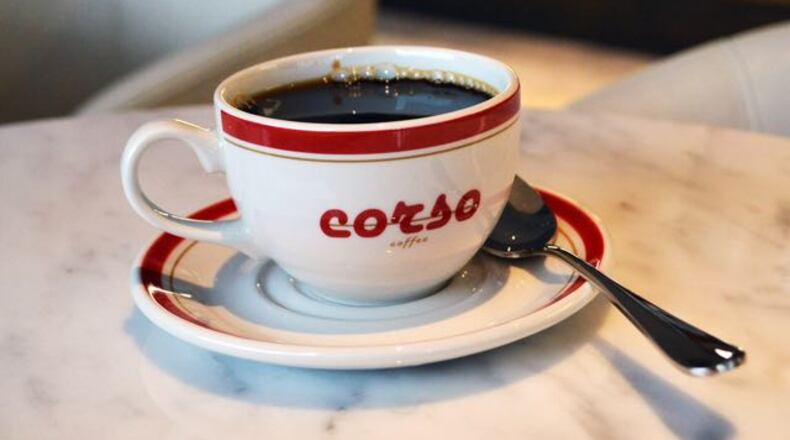New York City’s Corso Coffee has found an outpost in Atlanta. The upscale coffee bar opened in Buckhead Atlanta in late December, and it’s white-tiled, clean lined display matches the high-gloss tone of the neighborhood. But besides having a fancy interior, Corso’s espresso beans, Aneri Tricaffe, are rare. LDV (La Dolce Vida) Imports, the company behind Corso, is the exclusive importer and partner of Aneri Tricaffe for the U.S., Canada and all of Latin and South America.
Aneri Tricaffe's story began in Italy in 1993, where the Aneri family began managing a local Italian coffee roaster that had been established in 1949. The family continued to follow the traditional slow-roasting technique that involved using acacia wood to preserve and enhance the flavors of the beans. True to Italian tradition, the family has a strong belief that their products should use the best ingredients possible. The espresso beans come from a blend created by Trieste’s Sandali Coffee Masters. The Aneri family are also producers of prosecco and and wine.
Credit: Alexa Lampasona
Credit: Alexa Lampasona
Here Le Dolce Vita’s coffee expert, Gennaro Oliva, shares the scoop on their espresso beans.
Talk about the importance of using Acacia wood.
I’m from Tuscany, and acacia is the prominent wood. The reason why acacia is chosen over other wood varieties is because a study was performed many years ago to compare acacia, cherry, chestnut and other heavy, more compact, less moist woods from Italy. Acacia was most successful and strongest -- when you put it in the oven, the temperature doesn't vary much higher or lower -- it keeps a constant. Compared to other woods, acacia is more expensive -- but it works better.
What makes wood-roasted espresso different?
In the espresso roasting process, we want to make sure that wood doesn't influence the flavor of the espresso -- because in reality, wood absorbs flavors rather than gives flavors. In wood roasting, the process has to be slower and softer, which allows the beans to slowly roast and be softly handled. Roasters have to be present to manage the wood and roasting throughout the whole process.
You slow-roast beans for 25 to 30 minutes. How does this affect the coffee?
Traditional roasting for beans is 9 to 11 minutes, but by slow roasting the oil doesn’t completely come out from the beans. Instead of a bean that is dry and dead inside, slow roasting keeps the beans alive and fully preserved. The oil is primarily important to the crema (the part on top, which has most of the flavor.) Slow roasting with wood allows the beans to preserve the oil inside and outside. Therefore our beans to preserve themselves for a longer time, and the product stays fresh much fresher longer.
Here’s how Oliva recommends you to order Corso’s espresso.
- Order a simple espresso, plain.
- Make sure you drink it not fast, but enjoy it -- like when you taste a glass of wine and try to taste and appreciate all the flavors.
Credit: Alexa Lampasona
Credit: Alexa Lampasona
Credit: Alexa Lampasona
Credit: Alexa Lampasona
About the Author
The Latest
Featured





